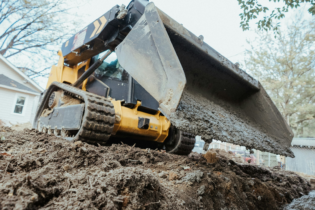Building industry organisations and experts are “very concerned” about the government’s intention to consider establishing a state-owned construction company.
“This is just another hair-brain scheme,” Llewellyn Lewis, the principal consultant at the BMI building research strategy consulting unit, said on Friday. “I think government must stay out of management of business. They can’t do it. They must rather engage with the private sector,” he said. Lewis stressed that the skills were in the established building industry, which knew how to plan and build and were experts in this field. The government should engage with the building industry to develop trust, pay the industry on time and expedite the flow of work, he said. Human Settlements Minister Tokyo Sexwale mooted the possibility of a state-owned construction company in his budget vote speech last week, because of continuing problems with the quality of housing units built largely by “inexperienced shovel, wheelbarrow and bakkie brigades”. Sexwale said the rectification bill for shoddily built housing units continued to grow year after year. More than R400 million of the Human Settlements Department’s budget last year was spent “on rectification of shoddy houses that pre-date the year 2002, which could otherwise have been used to construct more than 7 000 housing units”. “Is it perhaps not time to establish a state-owned construction company? We at Human Settlements are exploring this idea together with Public Works. Let us debate it,” the minister said. Tumi Dlamini, the executive director of Master Builders South Africa, said it was “very concerned” with the direction being taken by the minister.Dlamini said the introduction of a state-owned firm would destabilise the existing building industry, which had a proven track record and expertise comparable with the best in the world, and negatively affect its growth and sustainability as well as its ability to create jobs.
“We are very concerned that the thought of a new company comes at a time when the government faces one of its major challenges regarding capacity and expertise within its departments, resulting in its inability to deliver essential services for the people of this country. “This casts major doubt on the ability of a government to form, run and manage its own construction firm that could rival or even equal the current expertise found within our sector,” she said. Dlamini added that the MBSA would be requesting a meeting with Sexwale to discuss and get a deeper understanding of his plans. Andries van Heerden, the chief executive of listed construction materials group Afrimat, said the government did not have a good track record in terms of the performance of state-owned companies. He said there were better ways for the government achieve its aim, such as taking an approach similar to the SA National Roads Agency that “really works”. This involved getting competent, skilled and experienced management in the company to manage projects that were executed by the private sector, he said. However, Lewis questioned why another body was needed to manage the housing construction process. “What is the Department of Human Settlements there for?” he said. Rob Johnson, the executive director of the Master Builders Association of the Western Cape, said the key to delivery was the state remaining the client and properly screening bidding contractors. He said a state body could also raise the level of corruption and political interference.





